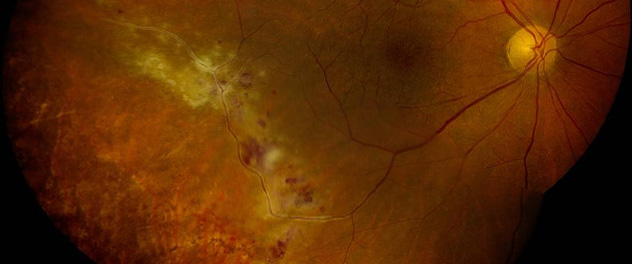 Tackling transplant-related infections
Tackling transplant-related infections
Cytomegalovirus infection is an important complication that contributes to poor overall survival in transplant recipients. Our lab team is working to advance prevention and treatment strategies to improve outcomes. This image shows cytomegalovirus retinitis in a transplant recipient.
Overview
Research in the Infection and Immunity Laboratory of principal investigator Raymund R. Razonable, M.D., targets infectious diseases. Our work is aimed at understanding host-pathogen interaction and improving the management and outcomes of various infectious diseases. Our major focus is on transplant-related infections.
To achieve this goal, we have:
- Laboratory-based and translational research projects that are aimed at understanding the interaction between the human host and the invading microbe.
- Translational research projects that apply laboratory data to the clinical arena.
- Clinical projects to assess the state of clinical practice and to generate relevant questions that need more laboratory-based investigations.
Several ongoing projects are assessing the risk factors, treatments and outcomes of cytomegalovirus (CMV) infection and other viral, bacterial and fungal infections after organ transplantation. We also have ongoing clinical trials aimed at studying vaccines and antiviral drugs to treat cytomegalovirus and other viral diseases that can occur after transplantation. We also study coronavirus disease 2019 (COVID-19).
About Dr. Razonable
In addition to running the Infection and Immunity Laboratory, Dr. Razonable is a professor of medicine at Mayo Clinic College of Medicine and Science in Rochester, Minnesota. He was named a 2023 Teacher of the Year by the Mayo Fellows Association. He also was named Program Director of the Year for 2023 by Mayo Clinic School of Graduate Medical Education in recognition of his extraordinary contributions to the success of the school, trainees, and clinical and learning environments. Dr. Razonable also is vice chair of the
Department of Infectious Diseases at Mayo Clinic in Minnesota. As a clinician who treats patients, Dr. Razonable is driven to improve treatment options for people who develop transplant-related infections.
Read more about Dr. Razonable.